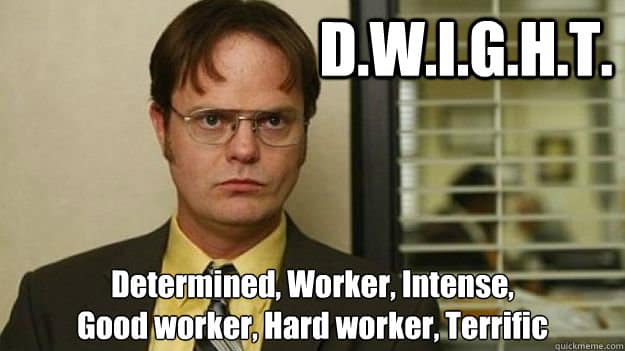You can make a great first impression at face-to-face tech interviews. Conversing with a potential employer can show your enthusiasm for the role and build rapport. Also, you can better understand the culture and environment and whether you’ll enjoy working for the company, which can’t be gained over the phone.
Face-to-face interviews, however, can be way more daunting than a phone interview, since there’s more to consider. You will need to be prepared to speak clearly, listen carefully and make sure you answer questions in detail. Body language and eye contact can also make a big difference in how you come across.
What should you bring with you?
You’ll also want your laptop to show examples of your previous work at the interview. Make sure you have easy access to these examples. If you can’t access these examples, quickly and easily, during your interview, you might lose confidence. Make sure your laptop is fully charged and bring your charger (just in case). Make sure your mobile examples are also easy to access on a fully charged phone. But remember to keep it on silent!
Having notes prepared on your examples will help you showcase them in a clear and concise way. Print examples, if applicable, and your CV.
Do your research.
Learn as much as you can about the company you’re interviewing with before your tech interview. Make a good impression and show that you understand the company’s culture by knowing its history, mission, and values.
Start by checking out the company’s website and social media accounts. Here you can learn more about their products, services, and goals, as well as current news. Make sure you are fully aware of all of the requirements of the role and are able to provide examples for each of them.

Look at the company’s competitors too. Understanding what makes the business unique and how it differentiates itself from the competition can help you provide better answers during the interview.
Last but not least, research the interviewer. You can tailor your responses and ask more relevant questions if you know who you’re meeting with and their role within the company.
Practise your answers.
Now you can’t really predict what the interviewer will ask you, and you can almost guarantee a curveball question that might throw you off and keep you on your toes, but if you’re well prepared to answer some common competency-based tech interview questions, then you’ll feel more relaxed and confident
Here are some examples of questions to get you started:
– Can you tell me what resources you need to do your job?
– What do you do to keep your skills current?
– If you didn’t know [target technology], how would you explain it to someone who didn’t know it?
– For this role, what strengths do you think are most relevant?
– What do you think will happen to your skills/job with the upcoming tech advances?
– In your first six months, what do you hope to accomplish?
– What makes you want to work here?
Be yourself!
When you’re interviewing for a job that you want, you might try to portray yourself as the ‘perfect employee’, but what does that even mean? Being ‘perfect’ is not only unrealistic, but also subjective, so you’re setting yourself an impossible goal.
Even without setting unrealistic goals, an interview can be nerve-wracking. It is important that the interviewer sees your best qualities and abilities, but they should also be realistic and true. Your new job will be more stressful if you embellish your skills and experience. The last thing you want to do is boast about a skill that they really want, but you don’t actually have. If you are given the role and are asked to use that skill, it will backfire on you.
In order to be happy in your job, you need to know if this role and the company are the right fit for you. Interviewers also want to know if you’ll be a good fit for their team. Being yourself allows you to talk freely and let your personality shine through, allowing you to have a more relaxed conversation with the interviewer.

Don’t be embarrassed to sell yourself.
While it’s important not to over-embellish, some people are just too modest.
An interview is a great time to talk about yourself and your accomplishments. Everyone brings something to the team, so make sure you know what you can do! It’s obvious you’ve got skills and talents that the company wants, otherwise, you wouldn’t be there.

Ask questions.
At the end of the interview, your interviewer will ask if you have any questions. It’s so tempting to say, ‘No, we’ve covered everything’. In the event that you feel the interview went well, you might want to wrap things up as soon as possible.
Don’t let yourself fall at the last hurdle! The questions you ask will demonstrate how interested you are in the role and the company. You run the risk of appearing uninterested or unmotivated if you don’t ask questions.

You’ll also want to make sure the company/team/manager fits your skills and personality. Your interviewer’s answers might reveal a lot about how they operate and what you can expect.
Prepare at least five questions. The interview should have covered a lot of ground, so you want to make sure you have a question prepared that you haven’t already discussed. Don’t be afraid to write these questions down and refer back to your list; you’ll show how well-prepared you are.
What is it that you really want to know about the business/team/manager? If you are successful in securing the position, what do you hope to accomplish? When creating your list of questions, use these as a starting point.
We’re here to help!
You can contact your Darwin consultant for assistance with all aspects of your interview. Call us before your interview if you have any questions or if you’d like to learn more about the company or person you’re interviewing with. We’re here to help!
Wishing you the best of luck in your interview and don’t forget to give your recruiter feedback!





